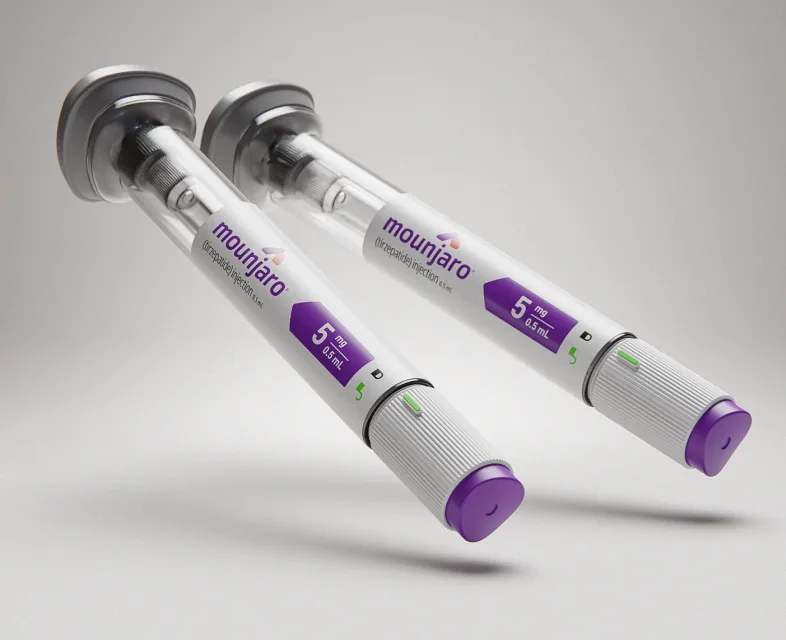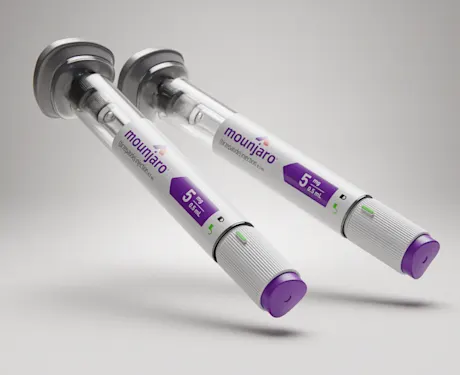

Important Safety Information for Mounjaro®
Important Safety Information for Mounjaro (tirzepatide) injection
Warning: Risk of Thyroid C-Cell Tumors
In rats, Mounjaro caused thyroid tumors, including thyroid cancer. It is not known if Mounjaro will cause thyroid tumors or a type of thyroid cancer called medullary thyroid carcinoma (MTC) in people. Tell your provider if you get a lump or swelling in your neck, hoarseness, trouble swallowing, or shortness of breath. These may be symptoms of thyroid cancer.
Do not use Mounjaro if you or any of your family have ever had a type of thyroid cancer called medullary thyroid carcinoma (MTC) or if you have an endocrine system condition called Multiple Endocrine Neoplasia syndrome type 2 (MEN 2).
What is the FDA-approved use of Mounjaro?
Mounjaro is used as an adjunct to diet and exercise to improve glycemic control in adults with type 2 diabetes mellitus.
Limitations of Use:
It has not been studied in patients with a history of pancreatitis
It is not indicated for use in patients with type 1 diabetes mellitus
Who should not use Mounjaro?
Do not use Mounjaro if:
You or any of your family have ever had a type of thyroid cancer called medullary thyroid carcinoma (MTC) or if you have an endocrine system condition called Multiple Endocrine Neoplasia syndrome type 2 (MEN 2).
You have a known allergic reaction to Mounjaro
How should Mounjaro be administered?
You can take Mounjaro with or without food. The pre-filled injector pen is self-administered as a subcutaneous injection in the stomach, thigh, or upper arm once a week on the same day every week. The injection site should be rotated every week.
You should not change your dosing regimen or stop taking Mounjaro as prescribed without discussing with your provider first.
What should I tell my provider before using Mounjaro?
Mounjaro has certain drug interactions. It’s important to tell your provider all of the medications you are currently taking, including prescription, over-the-counter medications, vitamins, and herbal and dietary supplements.
Some medications to watch out for include:
Medications for diabetes: Medications used to treat type 1 or type 2 diabetes, including insulin or sulfonylureas (such as Amaryl or Glucotrol XL)
Other oral medications: Mounjaro causes a delay in gastric emptying, so it has the potential to impact the absorption of medications that are taken by mouth at the same time. Your provider can guide you on how to schedule your medications.
Hormonal birth control: If you are using an oral hormonal contraceptive (birth control), Mounjaro may decrease its efficacy, especially after the first dose. Switch to a non-oral contraceptive method or use a barrier method of contraception for 4 weeks after starting Mounjaro and for 4 weeks after each dose escalation, until you reach a maintenance dose.
Other GLP-1 medications: Including Wegovy, Ozempic, Saxenda, Victoza, Byetta, or Bydureon. These medications should not be taken with Mounjaro.
Other products for weight loss: Including dietary supplements
It’s important to share your entire medical history with your provider. In particular, tell your provider if you have or have a past history of:
Type 1 or type 2 diabetes
Thyroid cancer
Pancreatitis
Kidney disease
Gastrointestinal disease
Diabetic retinopathy
Tell your provider if you are pregnant, planning to become pregnant, or breastfeeding.
If you are pregnant: Mounjaro should not be used during pregnancy. Based on animal studies, there may be potential risks to an unborn baby from exposure to Mounjaro during pregnancy. If using Mounjaro for weight loss, there is no benefit to weight loss during pregnancy and it may cause harm to the unborn baby.
If you are a female reproductive potential: Mounjaro may reduce the efficacy of oral hormonal contraceptives. Switch to a non-oral contraceptive method, or add a barrier method of contraception for 4 weeks after starting medication and for 4 weeks after each dose escalation until you reach a maintenance dose.
If you are breastfeeding: It is not known if Mounjaro passes into breast milk. Talk to your provider first about the benefits and risks of using Mounjaro while breastfeeding.
Withholding or providing inaccurate information about your health and medical history in order to obtain treatment may result in harm, including, in some cases, death.
What are the most serious side effects that I or a caregiver should monitor for when taking Mounjaro?
If you are experiencing a medical emergency, call 911 or seek immediate medical attention.
These serious side effects can occur with Mounjaro. You or a caregiver should carefully monitor for these side effects, especially in the beginning of treatment and with dose changes.
Thyroid C-Cell Tumors: In rats, Mounjaro caused a dose-dependent and treatment-duration-dependent increase in thyroid C-cell tumors. It is unknown whether Mounjaro causes thyroid C-cell tumors in humans. Mounjaro is contraindicated in patients with a family history of medullary thyroid cancer (MTC) or in patients with Multiple Endocrine Neoplasia syndrome type 2 (MEN 2). Tell your provider if you get a lump or swelling in your neck, hoarseness, trouble swallowing, or shortness of breath. These may be symptoms of thyroid cancer.
Inflammation of Pancreas (Acute Pancreatitis): Monitor for signs of acute pancreatitis, including severe abdominal pain that does not go away, sometimes radiating to the back, with or without vomiting.
Low Blood Sugar (Hypoglycemia): Mounjaro lowers blood glucose. It can cause too low blood sugar in patients with type 2 diabetes who also take another glucose control medication. Monitor your blood sugar and watch out for signs of too low blood sugar such as dizziness, blurred vision, mood changes, sweating, or fast heartbeat.
Allergic Reactions: Allergic reactions, including itchy rash and eczema, have been reported with Mounjaro. Stop using Mounjaro right away if you experience symptoms of a serious allergic reaction, including swelling of your face, lips, tongue or throat, severe rash or itching, very rapid heartbeat, problems breathing or swallowing, or fainting or feeling dizzy.
Acute Kidney Injury: Gastrointestinal side effects of Mounjaro like diarrhea, nausea, and vomiting may cause a loss of fluids (dehydration), which may cause kidney problems if dehydration is severe. It is important for you to drink plenty of water to help reduce your chance of dehydration.
Severe Gastrointestinal Disease: Mounjaro is associated with gastrointestinal side effects, such as nausea, diarrhea, vomiting, constipation, and stomach pain, and can sometimes be severe. It hasn’t been studied in patients with severe gastrointestinal disease and isn’t recommended in these patients.
Diabetic Retinopathy Complications in Patients with a History of Diabetic Retinopathy: Rapid improvement of glucose control has been associated with temporary worsening of diabetic retinopathy. Tell your provider right away if you experience changes in vision.
Acute Gallbladder Disease: Some patients reported gallbladder problems in clinical trials, including gallstones. Some gallbladder problems require surgery. Tell your provider right away if you have pain in your upper stomach, yellowing of skin or eyes (jaundice), fever, or clay-colored stools.
Never Share a Pen: Pen-sharing poses a risk of infection.
What are the most common side effects of Mounjaro?
Nausea
Diarrhea
Decreased appetite
Vomiting
Constipation
Indigestion
Stomach pain
You are encouraged to report negative side effects of prescription products:
Contact Eli Lilly and Company at 1-800-LillyRx (1-800-545-5979)
Contact FDA MedWatch at 1-800-FDA-1088 or visit www.fda.gov/medwatch
This information is not comprehensive. Please see the full Prescribing Information for complete safety information.